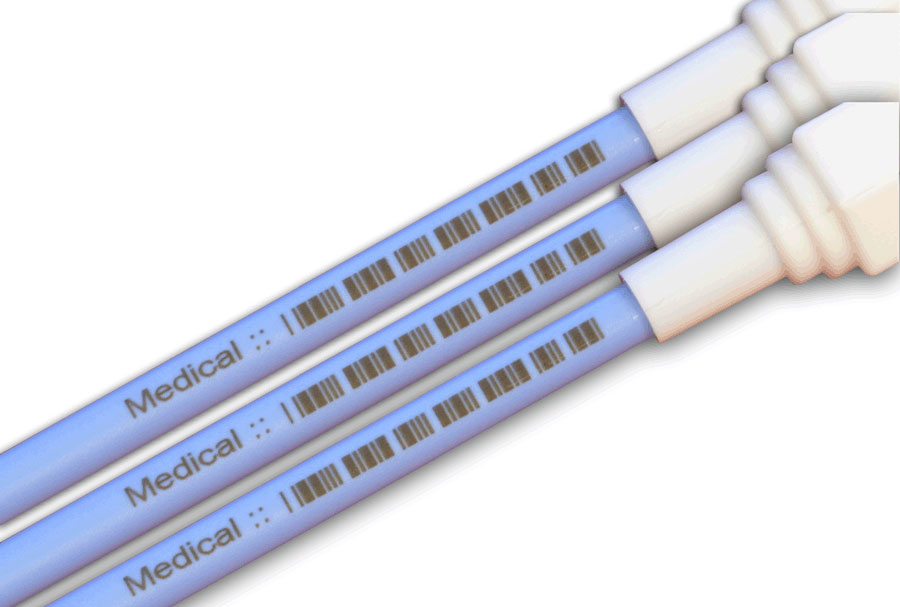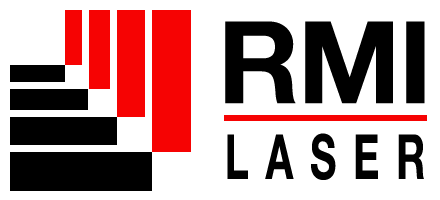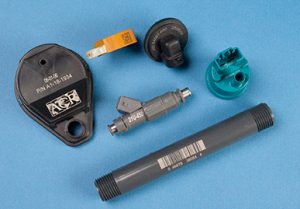Laser engraving systems face big challenges when it comes to marking on plastics. Let’s take a look at the issues manufacturers face and why fiber lasers are typically not the best answer.
Plastics are very diverse in their chemical and material composition, so they can be quite unpredictable when it comes to producing good markings with a laser. Most laser markers will simply overpower a plastic surface with heat, which can lead to burning, bubbling, scorching, melting, or otherwise damaging the material. With certain types of plastics like nylon, Teflon or rubber-based materials, the traditional 1064nm wavelength of a fiber, YAG, or YVO4 laser may not absorb at all, resulting in no mark.
Why fiber lasers struggle with plastic
Fiber lasers use state-of-the-art technology and are the bonafide standard for industrial laser marking on most metals. At RMI Laser, we offer an array of very popular fiber lasers, including MOPA solutions. The results you get when trying to mark plastics with fiber lasers, however, can be mixed. Fiber lasers tend to be overkill for plastic surfaces due to their high-powered delivery characteristics.
Fiber lasers that have a fixed-pulse width are particularly challenging for plastic marking because of their longer pulse duration. This exposes the plastic product or part to more heat and energy, which leads to overheating and overpowering the material that you are trying to laser engrave.
It is possible for fiber laser users to experiment with lowering the power and changing the line spacing and the number of pulses and passes of the beam to get a better result. Lowering the power too much, however, can lead to beam instability, which can produce erratic marking results.
One alternative is to use a MOPA-based fiber laser marker with a variable-pulse-width (duration) beam delivery. This may improve results, but at a cost premium with time-consuming experimentation required.
DPSS lasers offer an ideal alternative
Thanks to their unique power delivery characteristics, lesser-known DPSS (diode-pumped solid-state) systems offer some inherent advantages that make them excellent plastic-marking lasers. Because a DPSS laser has shorter pulse widths, it can deliver an effective high-peak power beam that can laser engrave without hanging out on the surface too long. As a result, there is no damage due to excess heat.
One advantage of DPSS lasers is that they are able to create marks with much less power than their fiber cousins. RMI Laser offers DPSS lasers with average power levels of 1 watt, 5 watts or 10 watts compared to the 20 watts that most fiber laser marking systems use.
DPSS lasers can be designed to produce ‘green’ laser light at 532nm through an optical process called ‘frequency doubling’. Because materials like nylon and Teflon have a much easier time absorbing this type of light, DPSS lasers are able to produce a mark on them that fiber lasers cannot match.
Marking on plastics for the medical industry

In the medical field, plastic parts are crucial for many applications. Some must be marked with a unique device identification (UDI) as required by the FDA. This marking must be on the device or part itself and not printed onto a label. These markings must be permanent and not fade over time.
UDI markings cannot compromise the object’s strength, durability or ability to be sterilized in an autoclave (if applicable). This is why DPSS lasers are ideal – both in cost and desired results – when it comes to marking plastic medical parts. Because DPSS lasers have high peak power over a shorter pulse duration than fiber lasers, they make much more effective plastic-marking lasers. You can compare it to using a scalpel as opposed to a sledgehammer.
DPSS solutions from RMI Laser
RMI Laser produces laser markers for almost any type of industrial or medical need. Our complete lineup of DPSS laser marking systems produces outstanding results on virtually any plastic material. We offer a compact, low-powered UM-2 (1w YAG laser), a higher speed U-10 (10w YVO4 laser) and a U-5G (5w Green laser) for special materials.
Our low-powered UM-2 Micro Laser is a good laser marking machine at an affordable price point for small businesses and those just beginning to offer laser-engraved products. Its small footprint and portable design make it ideal for small work cells or even trade shows, festivals, conferences and retail environments with on-demand marking.
The user interface of the UM-2 (1w YAG) laser is simple enough that a new user can learn to operate it easily with just a few minutes of practice. Since it’s not a high-powered piece of equipment, it operates slower than its heftier counterparts. However, the UM-2 Micro Laser is still ideal for sensitive plastics like polycarbonate, a material commonly used in the medical industry.
If you need to output a higher volume of parts than the UM-2 can handle, we also offer the U-10 Laser, a more powerful laser marking machine designed specifically for marking on a variety of plastic materials with precision and speed. Our U-5G Green Laser marking machine is also an excellent option for super-sensitive or hard-to-mark plastic materials.
Take the next step in choosing a plastic-marking laser
If you’re not sure which plastic-marking laser will best suit your needs, RMI Laser welcomes you to submit a sample of your product so we can determine which machine will work the best. (See the form at the top of this page.) Before spending thousands of dollars on new equipment for your business, we recommend testing on a full range of lasers first to ensure that you’re getting the ideal solution.


